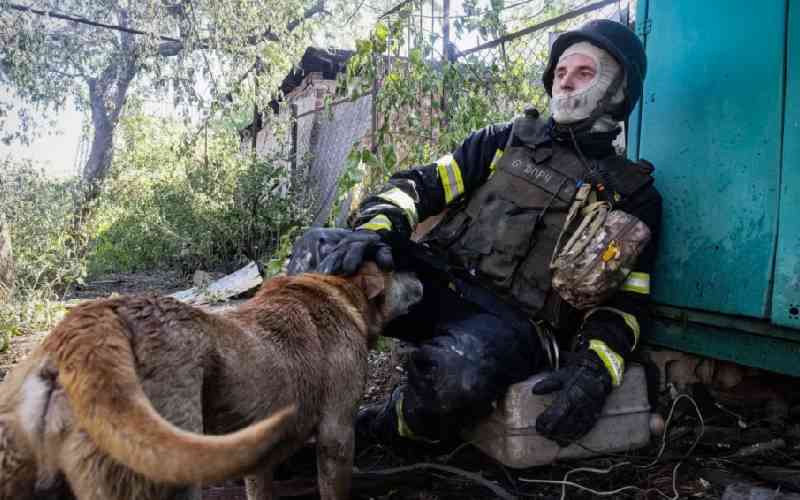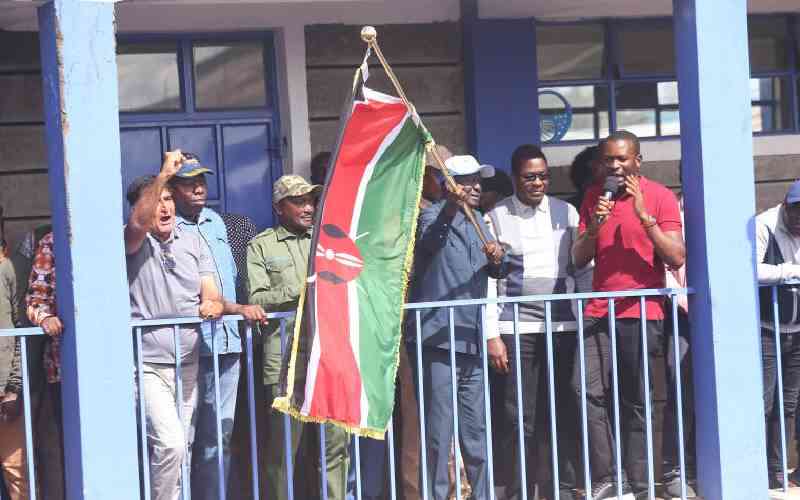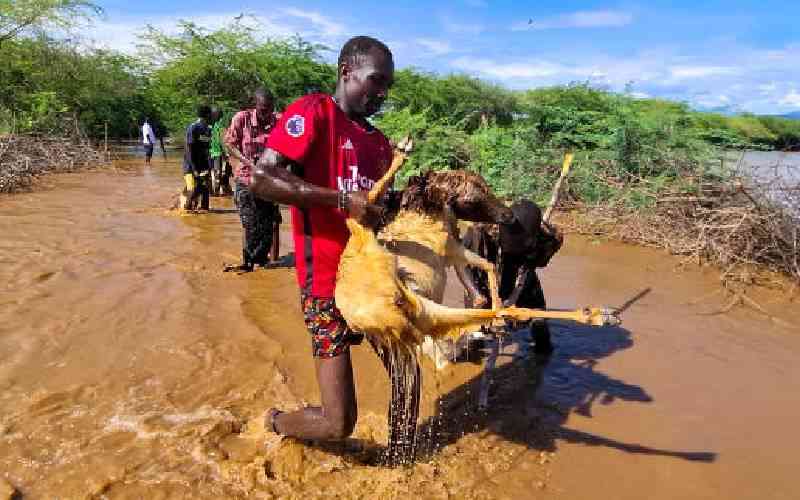 |
|
Families ponder their next move after Kenya Forest Officers torched their houses at Embobut Forest in Elgeyo-Marakwet County. [PHOTOS: PETER OCHIENG/STANDARD] |
By Fred Kibor
Hundreds of people, among them children and women, are out in the cold outside Embobut Forest area after they were brutally evicted from their homes this week.
All school-going children evicted from the forest are now out of class because some lost their books and school uniforms to fierce fire after security teams set their houses on fire.
Desolate families living without food and water are now camping by the roadsides in Embobut, a situation reminiscent to the suffering that was visited upon the Mau Forest evictees by the President Kibaki’s administration.
This week, Kenya Forest Service (KFS) officials effecting the eviction order against Embobut forest dwellers in Elgeyo/Marakwet County came face to face with the reality that theirs was an exercise too inhumane.
The armed officers arrived early and quickly set up huge fires across the vally as they torched houses and chased feeing occupants.
When they arrived at one of the homes, they were stopped on their tracks by a woman who was in labour pains at one of the huts.
The woman, with relatives and neighbours on her side, had resigned to fate and decided to give birth in her house with the aid of traditional birth attendants since the nearest health centre where she could give birth was kilometres away.
Abandoned mission
“Other houses in the neighbourhood were burning but when the officers saw that the woman was indeed in labour, they were forced to abandon their mission and mobilize fleeing residents to assist the woman give birth,” said Stephen Korir, her neighbour.
Out of sympathy, the guards spared the house but the woman and her unborn child faced serious danger as wind swept flames that consumed houses outside, threatening to reach her house.
Her house is adjacent to another one that had been engulfed in a huge ball of a fire set up by the Government agents, as the eviction continued. Surprisingly, Korir says the officers decided to contain fire that was gutting neighbouring huts to avoid burning the woman’s house before the woman successfully gave birth to twins.
The squatters said that they have been subjected to a lot of suffering by the Government, prior and after compensation, since they cannot find an alternative land to settle.
Those who were compensated said they still had not gotten land to purchase and had pleaded with authorities to be allowed more time to look for alternative land to settle.
Tula Chelanga, 80, said that the government should have considered extending the eviction deadline to allow them get alternative settlement given that the local community traditionally rarely sell land.
Stay informed. Subscribe to our newsletter
“One month is not enough for one to get land, construct a house and build a house before moving the property,” lamented octogenarian who says she was brought up and has lived in the forest her entire life.
Tula Chelanga, 80, is among those who were left out of the compensation and is currently homeless after her house was brought down by the raging fire ingited by KFS.
She notes that she missed the compensation money because her name was not captured by the government task force that was vetting the squatters despite submitting all her details.
“I have a permit that was issued to us by the colonial government as genuine forest dwellers yet I was not included in the list,” she says.
Ms Chelanga is part of a group of 300 people currently camping along the roads leading to the forest after their houses were torched four days ago by the KFS officers when the eviction began.
Last week the government embarked on an eviction exercise to eject thousands of squatters that were still living in the forest since they were first evicted in 2009. The forest has over 20,000 squatters.
Last year, President Uhuru Kenyatta spearheaded a resettlement exercise that saw 2,874 people identified as genuine squatters that were living in the forest but thousands others claimed they were excluded from the list. And as the eviction Embobut forest entered its fifth day, the squatters continue to brace the severity of the exercise aimed at restoring the water catchment area that has been massively depleted by human activities. The squatters have been forced to live under deplorable conditions without food in makeshift camps as their houses were been torched in the operation meant at ejecting them from the forest with fears of diseases spreading looms.
Alice Suter, an evictee, says that children, women and the elderly are bearing the brunt of the eviction since they are left in the camps without food and water.
“We fear contracting contagious diseases because the camp keeps on crowding as more people keep trickling in and sanitation is poor,” she says.
Ms Chelanga is part of a group of 300 people currently camping along the roads leading to the forest after their houses were torched four days ago by the KFS officers when the eviction began.
Mzee Anthony Chemengich, 73, said that if the condition prevails the little resources they managed to bring along with them would be exhausted would be forced to depend on aid. “We have maize and other crops still on the farms but KFS have threatened us that if they find us inside the forest, then we would be arrested,” he said.
His 31 year old son, Benjamin Kemboi, said their children no longer go to school since the day the house were torched and have been housed by the relatives.
“Since the forest should protected, we need money to enable us buy settlement land elsewhere just the rest of us that have been compensated,” he said. However local county commissioner Arthur Osiya said the evictions is being carried in a humane manner without subjecting the squatters into more suffering.
Edwin Kiplagat said that they have been forced to move out of the forest since they have been compensated or risk being arrested if they are found still there.
“We understand the government compensated us but majority of the forest dwellers were left out and we don’t know where to go to,” he said.
Kiplagat said that they their families live in the makeshifts camps while they live under trees without food and water.
“We brace the night chill under trees because the camps cannot accommodate,” he said.
Another squatter, Michael Kosgei, said the camps are already congested which has constrained utilities.
“There are proper waste disposal because there are no toilets which has worsened the situation,” he said. Kosgei called upon humanitarian agencies to come forward and assist them with basic needs in a bid to contain the spread of diseases.
Solomon Chesire said that the situation might get worse if the rains start soon since the structures they use as shelters were very deplorable.
“We just entwined twigs to make shelters and used hides and leaves to cover them but would not sustain rains,” he noted.
 The Standard Group Plc is a
multi-media organization with investments in media platforms spanning newspaper
print operations, television, radio broadcasting, digital and online services. The
Standard Group is recognized as a leading multi-media house in Kenya with a key
influence in matters of national and international interest.
The Standard Group Plc is a
multi-media organization with investments in media platforms spanning newspaper
print operations, television, radio broadcasting, digital and online services. The
Standard Group is recognized as a leading multi-media house in Kenya with a key
influence in matters of national and international interest.
 The Standard Group Plc is a
multi-media organization with investments in media platforms spanning newspaper
print operations, television, radio broadcasting, digital and online services. The
Standard Group is recognized as a leading multi-media house in Kenya with a key
influence in matters of national and international interest.
The Standard Group Plc is a
multi-media organization with investments in media platforms spanning newspaper
print operations, television, radio broadcasting, digital and online services. The
Standard Group is recognized as a leading multi-media house in Kenya with a key
influence in matters of national and international interest.






